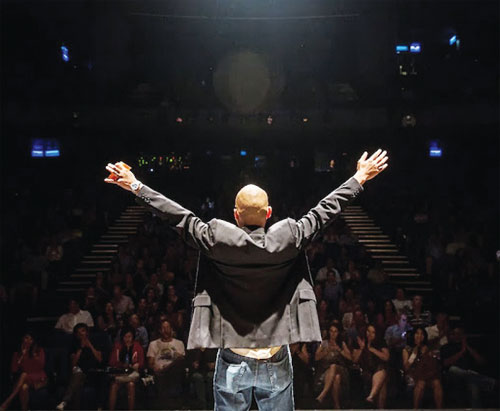Stand-ups who stand out
Updated: 2014-10-07 10:16
By Timothy Chui in Hong Kong(HK Edition)
|
|||||||||
The Eighth Annual Hong Kong International Comedy Festival, which ran for a month and concluded on October 5, is an English-only edition. Cantonese-and-Mandarin-speaking funnymen, sadly, had to be left out.
"For the first few years we had a Chinese-language competition too. But it wasn't growing and the same people were winning. I had hoped to have competitions in different languages running concurrently. But it'll take time, maybe decades. And it's wasn't paying the bills," Jameson Gong, founder of The TakeOut Comedy Club Hong Kong, told China Daily.
"I can pack the place with 160 people on Saturday night for an English show or have a handful of people for Chinese comedy," Gong said. So English it had to be, given the audience is mostly expats, visitors and Western-educated Chinese.
"Expats in Hong Kong miss going to stand-up shows like they have back home. Sarcasm isn't the same in Chinese as it is in English. Its quintessence usually is lost in translation," Gong said.
It's the improvisational nature of Western-style comedy - rooted in lightning quick wit - which is hardest for local audiences to accept. This presents a huge hurdle for budding local talent who don't want to risk losing face. Gong himself, who thought he was a pro - he's been at it since participating in an on-campus competition in 1989 - froze in front of a packed New York City comedy club in 1992.
"It was an eternity. An older gentleman in the front was telling me to go on but I was just frozen. Someone pulled me off stage, patted me on the back and bought me drinks. It wasn't until 1999 that I worked up the courage to get back on stage. My grandmother in Hong Kong was ailing. I made a vow to her to not let failure stop me again," he said.
Gong wanted to give the cultural scene in New York City's Chinatown a lift, hard-hit as it was by the terrorist attacks of September 11 and the SARS outbreak of 2003.
"I took it upon myself to revitalize entertainment in Chinatown. We started with monthly shows in 2003, which were sold out. We traveled across the US. Finally when I came to Hong Kong to bury my grandmother, I noticed there weren't any full-time comedy clubs here. So I set up shop and years later it's good to see the seeds we planted have taken root," he said.
It was a chance for home-bred comedians to brush up their act. "Seven years ago, you'd see 20 comedians taking 15 minutes when they had barely enough material for two minutes. It was excruciating to watch. Now we have 30 comedians who can kill for seven, 10, 12 minutes. The competition is getting tougher. I had to turn down more than 20 comedians who wanted to join this year," Gong said. "I'm focusing on Hong Kong but there is lots of networking and sharing of talent to do. Comics will fly into Hong Kong for a show and then do a short haul in say Singapore, Shanghai and Macao," he added.
Gong believes Boston-educated mainland Chinese Joe Wong, who is working on a series of projects with CCTV in Beijing, could get the ball rolling by introducing more Western-style standup to China. "China has so much potential, but needs someone with the connections to organize it. I'm not that guy," Gong said.
But Gong's goal is nothing short of international acclaim. There are 16 full-time comedy clubs in New York City and the three cities to know in the international comedy circuit are Edinburgh, Melbourne and Montreal. "I hope our comedy festival in Hong Kong will be in the same sentence some day," Gong said.
tim@chinadailyhk.com

(HK Edition 10/07/2014 page7)